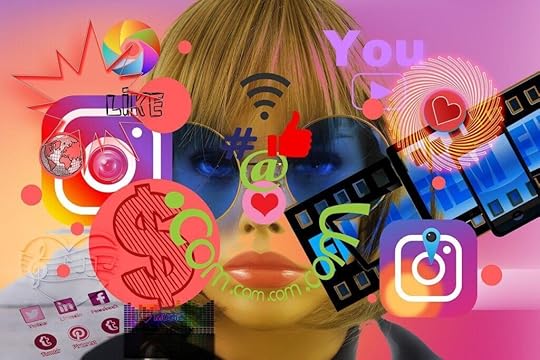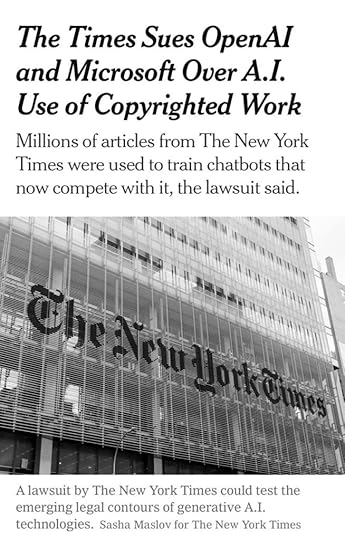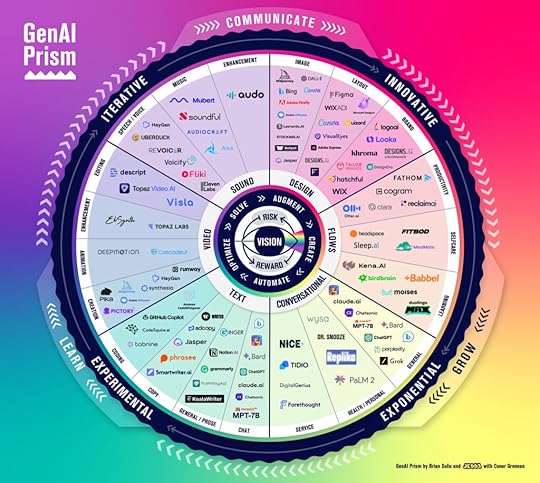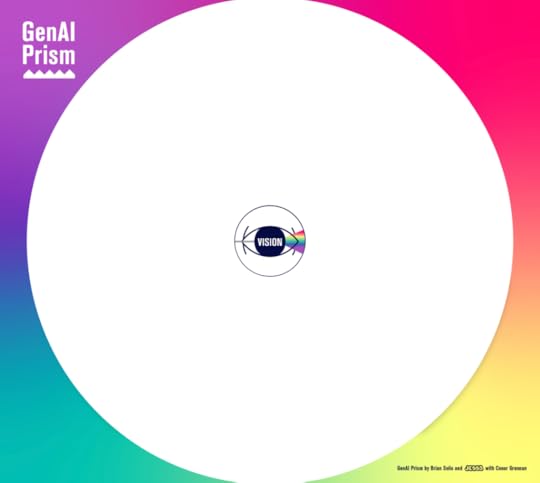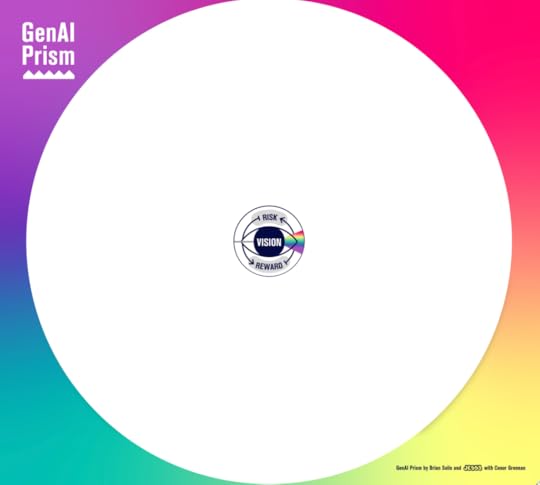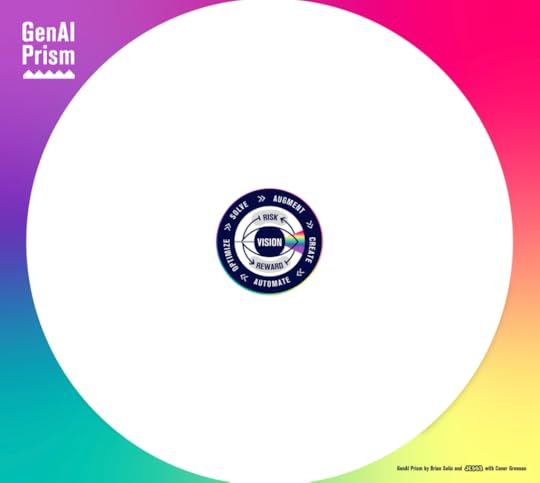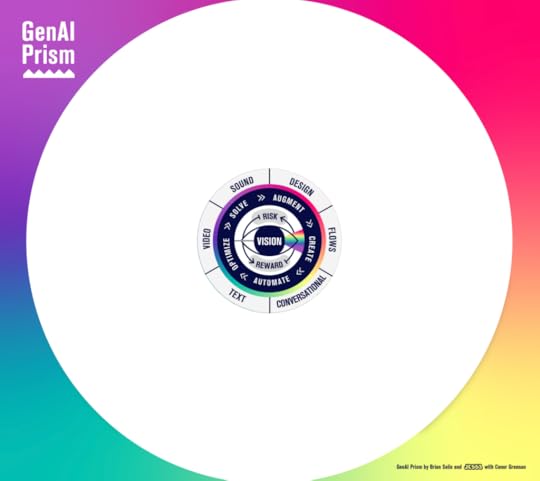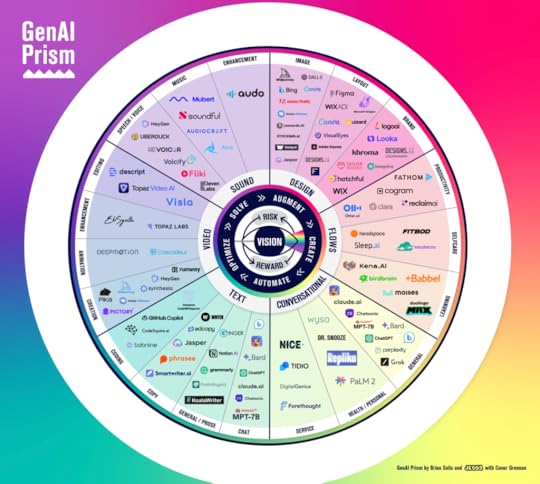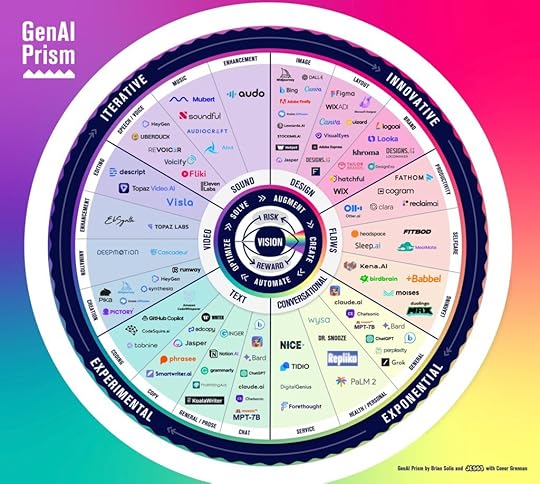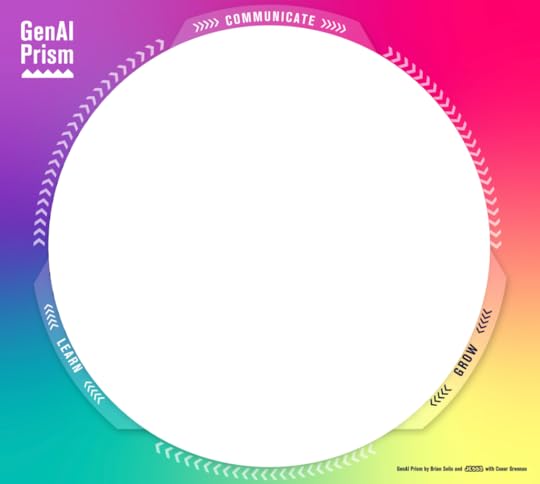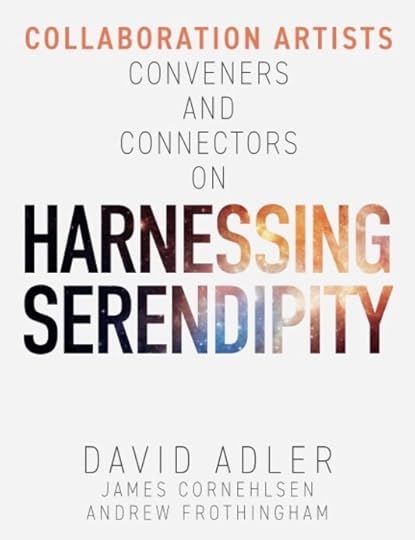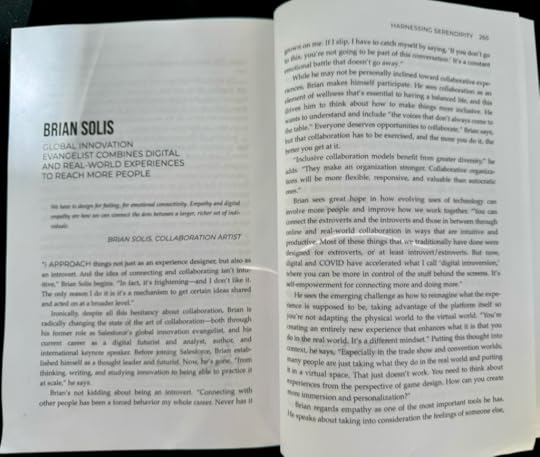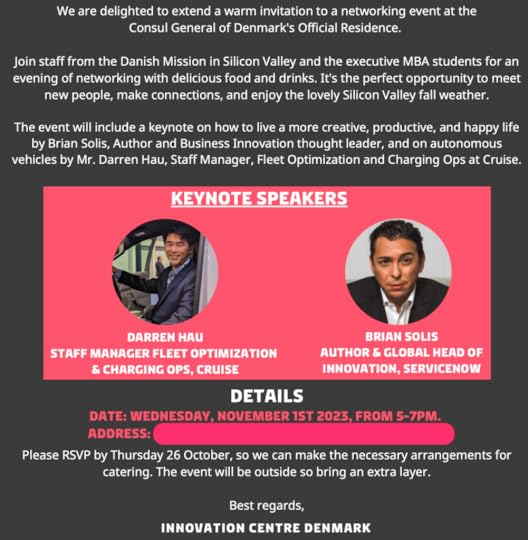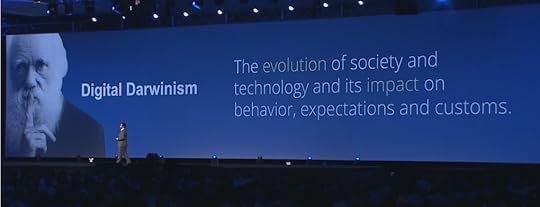Brian Solis's Blog, page 19
December 28, 2023
San Francisco Examiner Names Brian Solis As One of The Ten Most Sought After Brand Evangelists
via SF Examiner
While the term “influencer” may be used too often in too many ways – real influence does exist. For brands it is the evangelist that is paramount. They possess the unique combination of having influence and the ability to elevate the storytelling for a brand. Some are creators, some are product experts and some are the most highly trusted experts in their field. Here is why each of these evangelists are in high demand.
With any of these ten you can see commonality, components that help people achieve the absolute apex of brand evangelism. But more interestingly each has a different and diverse background, skillset and come from a variety of industries. It doesn’t matter where you start but they all understand the value of connection, collaboration and bringing their unique insights to help brands navigate tricky spaces where they lack that specific expertise.
The list includes Brian Solis. Click here to read the original article at San Francisco Examiner.
Brian SolisAs a world leading digital anthropologist and futurist, Brian Solis is an 8x bestselling author, the world’s top superforecaster according to Entrepreneur and ZDNet’s top business thinker of the 21st century. 700,000 followers and bylines in Harvard Business Review, Adweek and more, Brian is one of the original evangelists.
Currently the Global Head of Innovation at ServiceNow he is also a highly sought after and engaging keynote speaker globally and the host of (r)evolution, a popular video series that has interviewed Shag, Katie Couric, Marc Burnett and more on technology, leadership and blazing a trail.
The post San Francisco Examiner Names Brian Solis As One of The Ten Most Sought After Brand Evangelists appeared first on Brian Solis.
San Francisco Examiner: The Ten Most Sought After Brand Evangelists
via SF Examiner
While the term “influencer” may be used too often in too many ways – real influence does exist. For brands it is the evangelist that is paramount. They possess the unique combination of having influence and the ability to elevate the storytelling for a brand. Some are creators, some are product experts and some are the most highly trusted experts in their field. Here is why each of these evangelists are in high demand.
With any of these ten you can see commonality, components that help people achieve the absolute apex of brand evangelism. But more interestingly each has a different and diverse background, skillset and come from a variety of industries. It doesn’t matter where you start but they all understand the value of connection, collaboration and bringing their unique insights to help brands navigate tricky spaces where they lack that specific expertise.
The list includes Brian Solis. Click here to read the original article at San Francisco Examiner.
Brian SolisAs a world leading digital anthropologist and futurist, Brian Solis is an 8x bestselling author, the world’s top superforecaster according to Entrepreneur and ZDNet’s top business thinker of the 21st century. 700,000 followers and bylines in Harvard Business Review, Adweek and more, Brian is one of the original evangelists.
Currently the Global Head of Innovation at ServiceNow he is also a highly sought after and engaging keynote speaker globally and the host of (r)evolution, a popular video series that has interviewed Shag, Katie Couric, Marc Burnett and more on technology, leadership and blazing a trail.
The post San Francisco Examiner: The Ten Most Sought After Brand Evangelists appeared first on Brian Solis.
December 27, 2023
Generative Developments in AI – December 27, 2023
The latest news and trends in generative AI…
The Future of Generative AI Headed to CourtThe New York Times is suing OpenAI for using copyrighted IP to train its LLMs without credit or royalties. This could be OpenAI’s “Napster” moment. Here’s the filing.
At the same time, Apple is reportedly striking deals with media companies to train its AI using IP.
One of these two will define the future of generative AI.
A New Wave of AI Devices and Maybe Phones are on the HorizonIn other news, Jony Ive reportedly hired Apple iPhone and Watch designer Tang Tan to join him at LoveFrom. Experts believe that the team is working on an AI phone or device with Sam Altman, potentially creating the next “iPhone” moment.
With Humane first out of the gate with a consumer-facing AI device, 2024 might just set the stage for the next device war.
The post Generative Developments in AI – December 27, 2023 appeared first on Brian Solis.
Forbes: Brian Solis on AI for Marketers
Sandy Carter’s latest article in Forbes explores the optimistic and cautious perspectives of AI heading into 2024. The article features thoughts from Brian Solis.
As we approach the brink of 2024, the entwined paths of artificial intelligence (AI), blockchain, and spatial computing are not merely transforming industries; they’re also sculpting new ethical and societal contours. With every conference now an AI Conference including the upcoming CES in Vegas, everyone needs to think not just in terms of technology. In exploring how these technologies will evolve, it’s essential to examine their wider implications – from both the optimistic ‘Santa’ viewpoint and the cautious ‘Grinch’ perspective.
Brian Solis is a leading AI Influencer and is the head of global innovation at ServiceNow.
He had this to say, “Marketers should approach AI by thinking about how they want customers to feel rather than aiming for transactional engagement. AI can help your marketing become, ironically, more human. And when customers feel engaged it enhances their experience and likelihood to take action. That’s what customer experience is all about…the feeling someone has in the moment. AI can unlock digital empathy to create meaningful experiences.” Brian recently published the GenAI Prism with JESS3 to help executives understand the rapidly shifting generative AI landscape.
The post Forbes: Brian Solis on AI for Marketers appeared first on Brian Solis.
December 20, 2023
Introducing the GenAI Prism Infographic: A Framework for Collaborating with Generative AI
NEWS: Introducing the The GenAI Prism, the single most comprehensive representation of the generative AI universe.
JESS3 design studio and Brian Solis, digital futurist and best-selling author, announced the release of the GenAI Prism v1.0 infographic along with Conor Grennan, leading generative AI expert and Dean of Students/Head of GenerativeAI at NYU Stern School of Business.
Jeremiah Owyang, Venture Capital Investor at Blitzscaling Ventures, and my friend and former colleague, shared an observation that there are more than 10,000 generative AI projects in play right now. As the famous saying from the movie JAWS goes, “we’re going to need a bigger infographic.”
The effort took over six months to complete and included a panel of experts to help us assess the maturity of each category and company for impact, adoption, and potential. It’s safe to say that we consider this version 1.0 and there will be many iterations over time. Please see below for download links.
AboutThe GenAI Prism organizes the landscape of generative AI companies that automate and augment how people create and work in their personal and professional lives.
More than a visualization of the most popular generative AI logos, the GenAI Prism offers a mental model to mindfully and intentionally approach prompts toward more intentional outcomes and insights.
The GenAI Prism is a reference guide that to prompt human creativity and imagination to collaborate with AI toward more thoughtful, effective, and extraordinary outcomes.
GenAI isn’t here to do the work of people or replace them, but instead it serves as a creative partner to augment human output. It enhances, accelerates, and boosts the work we do today while also allowing us to perform and create outputs we couldn’t do before.
DesignThe design of the GenAI Prism is intended to ‘refract’ the GenAI ‘light’ to slow the speed of a fast-moving genre. Doing so allows viewers to reflect on the spectrum and understand the significance of each wavelength.
The GenAI Prism provides a visual workflow to put generative AI to work. It’s designed to future-proof human ingenuity by helping users formulate exponential outputs before the prompt. With practice, formulated prompts will unlock capacities not previously attainable to deliver exponential outcomes unimaginable just last year.
HistoryThe GenAI Prism follows the successful Conversation Prism series by JESS3 and Brian Solis dating back to 2008 – 2017. The Conversation Prism was designed to categorize the emerging Social Media landscape. Like the GenAI Prism, it also empowered users to be more intentional with their efforts to network, create, and build communities around their vision.
GenAI Prism FrameworkCenter: VisionYou are operating at the center of the prism. It’s your imagination and vision that will shape what emerges on the other side of the prompt.
Halo 1: Risk vs. RewardEvery prompt can feed different LLMs or language models in different ways that carry inherent risks and rewards. Because data is involved, some models and prompts must be evaluated for trust, and how that data is used to further train LLMs. It’s important to understand this as you also consider the potential rewards. Private data in certain models is no longer private.
Halo 2: Intended OutcomesAs you endeavor to bring your vision to light, consider the potential outcome you’d like to achieve.
1) Are you solving a problem?
2) Are you exploring new horizons to create something net new?
3) Are you optimizing or automating an existing process or product or service or works?
4) Are you augmenting something to perform exponentially?
5) Are you experimenting?
Halo 3: H1 GenreThese refractions represent the H1 genres for generative AI services and apps.
Halo 4-5: H2 Categories/CompaniesServices and apps are organized into H2 level categories which aim to arrange them by capabilities, activities, and outcomes.
The logos represented in each do not reflect the total spectrum of light. They represent those refracting the brightest light at the time of this experiment.
Halo 6: ResultsThe outcome you’ve envisioned and subsequently achieved, is now classified by type.
1) Was it iterative or incremental to what exists today?
2) Was it innovative? Did it create something net new? Or introduce new value?
3) Did it augment something that’s in motion today to exponentially impact output?
4) Was it experimental and did it provide insights into what to do or not do next time?
Halo 7: Engagement/NetworkingWilliam H. White wrote in 1950 that the great enemy of communication is the illusion of it. GenAI is new. It’s evolving. It’s incredible in terms of its potential, but also confusing, and even daunting. But the path to the future is forged by those who explore new horizons and live to tell. Our vision, and our investments into outcomes, and how we learn and communicate those learnings, will help us, and those around us, grow.
DownloadDownload the hi-res version and see its evolution at JESS3. The GenAI Prism is also available to download at flickr.
SignificanceIt’s been said that AI won’t take jobs, but those who use AI will have a strong advantage over those who don’t. Studies already show that with vision, creativity, and a commitment to experimentation, work not only accelerates, but also elevates the quality of output. In one such study, Wharton Professor Ethan Mollick in partnership with social scientists at Boston Consulting Group found that consultants who used AI finished 12.2% more tasks on average, completed tasks 25.1% more quickly, and produced 40% higher quality results.
The ultimate goal with generative AI is to enhance or more so, augment, the creative power of humanpotential, incorporating this technology to create and perform more thoughtful, effective, and extraordinary projects.
The GenAI Prism also serves as a guide to futureproof human ingenuity. The technology isn’t here to do the work of people or replace them, but be part of a workflow that puts AI in service of people. With practice, prompts will unlock capacities not previously attainable, especially by small startups, to deliver exponential outcomes.
Composer, musician, and avant garde artist Laurie Anderson once said, “If you think technology will solve your problems, you don’t understand technology — and you don’t understand your problems.”
The same is true for GenAI.
Anyone seeking to displace people with genAI doesn’t understand their existing problems or potential opportunities.
Augmentation is the key to becoming a next-generation AI-first business.
The post Introducing the GenAI Prism Infographic: A Framework for Collaborating with Generative AI appeared first on Brian Solis.
November 27, 2023
Harnessing Serendipity: A Guide to Mastering the Art of Creativity, Connection, and Collaboration
David Adler, along with James Cornehlsen and Andrew Frothingham, authored the new book, Harnessing Serendipity. I’ve known David for years. He’s the Chairman & Founder, BizBash. He’s also a friend.
Harnessing Serendipity is a book written for visionary and creative leaders to unlock the potential of artful collaboration.
The book features invaluable insights from 65 thought-leaders and change-makers across multiple industries, including me! Thank you, David!
This curated group of “collaboration artists” share their stories, philosophies, and methods, to help you rethink your approach to problem-solving, innovation, and how to set and achieve your goals.
I’d like to share my story with you and encourage you to read the book. I learned so much from other leaders across different industries and fields!
I remember this interview vividly. I was on the pool deck at the W Hotel in Nashville. I had just finished presenting to Tractor Supply about the potential new futures for rural retail innovation. When I received David’s call, I sat in an empty cabana, looked out across the city of Nashville, and savored this entire conversation.
Brian SolisGlobal Innovation
Combines Digital and Real-World Experiences to Reach and Influence More People
“I approach things not just as an experience designer, but also as an introvert. And the idea of connecting and collaborating isn’t intuitive to me,” Brian Solis begins. “In fact, it’s frightening The only reason I do it is it’s a mechanism to get certain ideas shared and acted on at a broader level.”
Ironically, despite all this hesitancy about collaboration, Brian is radically changing the state of the art of collaboration—both through his former role as Global Innovation Visionary and Strategist at Salesforce and now as Head of Global Innovation at ServiceNow. This is someone who works with hundreds of executives at some of the biggest organizations around the world to help them innovate and transform. Before that, his role as a digital futurist and principal analyst at Altimeter Group helped transform the technology industry and how business leaders approach innovation and digital transformation. Plus, this introvert has published eight best-selling books and keynotes events all around the world!
Now, he’s gone, “from thinking, writing, and studying innovation to being able to practice it at scale,” he says.
Brian’s not kidding about being an introvert.
“Connecting with other people has been a forced behavior my whole career. Never has it grown on me to become second nature. If I slip, I have to catch myself by saying, ‘If you don’t go to this or meet these people, you’re not going to be part of this conversation.’ And as the Cluetrain Manifesto famously observed, ‘markets are conversations.’ It’s a constant emotional battle that doesn’t go away.”
While he may not be personally inclined toward collaborative experiences, Brian makes himself participate. He sees collaboration as an element of wellness that’s essential to having a balanced life, and this drives him to think about how to make things more inclusive. He wants to understand, include, and represent “the voices that don’t always come to the table.”
“Everyone deserves opportunities to collaborate,” Brian Says, but that collaboration has to be exercised. The more you do it, the better you get at it.
“Inclusive collaboration models benefit from greater diversity,” he adds. “They make an organization stronger. Collaborative organizations will be more flexible, responsive, and valuable than autocratic ones.”
Brian sees hope in how evolving uses of technology can involve more people and improve how we work together.
“You can connect the extroverts and the introverts and those in between through online and real-world collaboration in ways that are intuitive and productive. Most of the collaborative exercises and tools that we traditionally use are not designed to give everyone a voice or optimized to bring out their best ideas. But now, digital and a global pandemic have accelerated what I call ‘digital introversion,’ where you can be more in control of the stuff behind the screens. It’s self-empowerment for connecting more and doing more.”
He sees the emerging challenge as an opportunity to reimagine what the experience is supposed to be, taking advantage of platforms and human nature to foster inclusivity, creativity, and collaboration. You’re not adapting the physical world to the virtual world. “You’re creating an entirely new experience that enhances what it is that you do in the real world. It’s a different mindset.”
Putting this thought into context, he says, “Especially in the events, networking, and conference/tradeshow worlds, many people are just taking what they do in the real world and putting it in a virtual space. That just doesn’t work for everyone. You need to think about experiences from the perspective of social media and game design. How can you create more immersion, interaction, and personalization in ways that maximize the platform to unlock intuitive and transcendent experiences? How do you bring everyone to the table, give them a voice, and motivate them to share their ideas?”
Brian regards empathy as one of the most important tools he has. He speaks about taking into consideration the feelings and aspirations of someone else, and keeping in mind that not all ideas can be extracted from each individual the same exact way. In his work, he extends the concept of empathy to what he calls “Digital Empathy.”
“I call digital empathy a love language,” he says. “Look at millennials and centennials, or Gen Y and Gen Z. They are digital-first, or digital-native, communities. The connect, communicate, and act differently. Their desired experiences are different. The better you integrate technology into a real-world setting using human-centered approaches, the more intuitive (and better) it is for them. You’re essentially designing for a native platform for human connections to foster the electricity of both digital and physical engagement. You’re not using digital to be digital. You use digital as a means of engaging both brain and biology, naturally. You bring the best of physicality and digital together so that everybody’s operating in a way that’s second nature.”
Brian is frank about the challenges involved in getting people to do things they aren’t initially inclined to do. “As an experience designer, it’s your job to design for specific experiences and outcomes [think customer experience (CX), employee experience (EX), brand experience (BX)]. But you can’t assume. You can’t impose your experiences and outcomes upon people. You have to work to align people around shared interests, objectives, and outcomes that people can work towards in a meaningful way. You need to bring people together around a shared purpose, a series of missions people are mutually vested in achieving. This is why the best experiences start with empathy. You have to understand and become the people you’re trying to engage.”
He illustrates this idea with a story about Muhammad Ali. “Ali said, ‘I don’t like working out, but I do visualize what being a champion looks and feels like.’ Collaborating is a form of exercise, but you’re doing it in a way that visualizes what the shared desired outcome is for everyone.”
Ultimately, the best way to get a sense of the power and sophistication of Brian’s approach is to listen to him describe it in use.
“We were working on an experiment around strategic networking using AI, near-field communication (NFC), and neuro-linguistic programming (NLP). The question was, ‘how do you get people to network when not everybody is a networker and how do you get the right people together from the onset?’ The premise was that you want to foster the type of engagement that takes advantage of why people are there: There’s usually a shared set of interests, favorite experiences, and desired aspirations and outcomes.”
“The solution involved designing this really cool and fun quiz to get everyone to participate,” he continues. “People got the quiz before the event. Whether you were extroverted or introverted, you felt it was your safe space, so you were motivated to answer the questions because you knew it would shape your experience. They were designed psychologically to nurture participation and bring out the type of information that was going to set the stage for the right types of connections and collaboration.”
The quiz allowed the team to skip things like icebreakers or random networking elevating the ability for people to find people like them. “Different people react differently. We fed a customer database where we used AI to match people with shared interests and outcomes and complementary modalities. Then we created a geolocation button that we placed on event badges so we could connect people on visual maps or through sound/lighting as they got closer to people that were interested in the same things. You could also view a digital heat map to find people and optimize your time on site.”
Brian describes it as “strategic serendipity.” It stripped out the awkwardness of ‘What do you do?’ or ‘Tell me more about you.’ “It broke down barriers and fostered meaningful connections, faster and accurately.” And it prompted connection between people to leapfrog the idle chats to get to productive and collaborative conversations sooner. People saved time, energy, and were able to get the most out of their experiences as a result.
In closing, Brian returns to the importance of designing for emotion inspired by empathy.
“There are only two kinds of experiences that people remember: those that suck and those that are extraordinary,” he says. “Everything in between is just transactional and forgettable. Too often, collaboration has been thought of as work that’s largely transactional and absent of emotionality. We have to design for feeling, for emotional connectivity. That’s where empathy becomes instrumental. Empathy and digital empathy are how we connect the dots between people to accelerate creative and strategic serendipity. Human-centered design partnered with technology then plays the role of enabler and facilitator. This amplifies opportunities for problem-solving, invention, and innovation. And that’s just want the world needs, solutions and community.”
What We Heard and LearnedThe moment is right for reimagining connections and collaboration…this is our “iPhone moment.”
Realize that you and those on your team aren’t reflective of the audience or the total prospective audience. You have to understand them to engage them.
Gain and practice empathy. Practice empathy and digital empathy and speak the love language of those who connect and collaborate differently.
Align people around shared interests and aspirations and make connections and journeys intuitive, experiential, and constructive.
Challenge yourself. Design against the best, most innovative experiences, outside of your industry.
Please read the stories of 64 other collaboration artists in Harnessing Serendipity.
The post Harnessing Serendipity: A Guide to Mastering the Art of Creativity, Connection, and Collaboration appeared first on Brian Solis.
November 22, 2023
OpenAI and the Events that Caused the Crazy Four Days Between Sam Altman’s Firing and Return
UPDATED
As the world turns, so do the days of AI…
Now that the dust is settling a bit, the behind-the-scenes story is beginning to piece together.
As we all know, Sam Altman, CEO of OpenAI, was suddenly fired by the board, setting in motion an epic implosion that threatened the future of the company, investor stakes, and partner relationships.
This series of events also cast a bright light on the importance of trust, governance, and purpose. I’m thankful for this, at least.
Now it’s coming to light that there were two factions: 1) Chief Scientist Ilya Sutskever and board member Helen Toner, and 2) Sam Altman and Greg Brockman.
At the heart of the matter appears to be a battle for humanity. No, I’m serious.
The Unique Org Structure that Governs OpenAI’s For Profit and Nonprofit InvestmentsOpenAI started in 2015 as a nonprofit to create a nonprofit to build A.I. that was safe and beneficial to humanity. It needed to if it were to achieve its divine mission of building a superintelligent system that could rival the human brain. What started as a private donor-funded enterprise evolved into a commercial need and opportunity.
In 2018, the company created a for-profit subsidiary that raised billions, including $1 billion from Microsoft. This new subsidiary would be controlled by the nonprofit board governed by a duty to “humanity, not OpenAI investors.”
With the unprecedented popularity of ChatGPT, the scale of humanity’s and OpenAI’s balance went off-kilter, according to some board members.
In particular, a rift ensued between Altman and Helen Toner, a (former) board member and Director of Strategy and Foundational Research Grants at Georgetown’s Center for Security and Emerging Technology (CSET).
Helen Toner’s association with Open Philanthropy, who pledged $30 million dollars to OpenAI early on, may have helped her earn a seat on the board.
Seeing Open ‘A’ Eye-to-EyeIt would later emerge that Toner and Altman no longer saw (Open A) eye-to-eye.
It’s now being reported, that a few weeks ago, they met to talk about a paper she co-authored that appeared to criticize OpenAI while praising Anthropic, the company’s main rival. Anthropic was started by a senior Open AI scientist and researchers who left after a series of disagreements with Altman. They asked the board in 2021 to oust Altman, and when that didn’t happen, they left the company. These past events would play a role in later developments…
Altman complained to Toner that the paper criticized OpenAI’s approach to safety and ethics. His point was that her words were dangerous to the company and its investors.
Altman later sent an email expressing that they weren’t “on the same page regarding the damage of all this.” He emphasized that “any amount of criticism from a board member carries a lot of weight.”
And, he’s right. It does. This is why it’s important to have an organizational and board structure that aligns with the company’s purpose, mission, and strategy.
So what exactly did Toner say?
Here’s an excerpt from her report:
“Anthropic’s decision represents an alternate strategy for reducing ‘race-to-the-bottom’ dynamics on AI safety. Where the GPT-4 system card acted as a costly signal of OpenAI’s emphasis on building safe systems, Anthropic’s decision to keep their product off the market was instead a costly signal of restraint. By delaying the release of Claude until another company put out a similarly capable product, Anthropic was showing its willingness to avoid exactly the kind of frantic corner-cutting that the release of ChatGPT appeared to spur.”
Let’s read that last part again…”exactly the kind of frantic corner-cutting that the release of ChatGPT appeared to spur.”
For an academic paper, this sentence is out of place. It’s personal judgement tied to an accusation rather than presented as a scientific research finding.
Altman discussed his concerns with Chief Scientist Ilya Sutskever whether Toner should be removed from the board. Instead, Sutskever sided with Toner. The events that led to the creation of Anthropic likely contributed to his rationale.
Instead of Toner being ousted, it was Altman.
As we all know now, Altman’s sudden firing seemed more imprudent than strategic and methodical. Microsoft’s CEO, Satya Nadella, arguably OpenAI’s most valuable partner and investor, only received notice one minute before the news was announced.
Hours later, the board was confronted by employees who emphasized that their decision had put the company in grave danger.
But the board remained defiant. Toner reminded employees of its mission to create artificial intelligence that “benefits all of humanity.” And according to The New York Times, Toner went a drastic step further, stating if the company was destroyed, “that could be consistent with its mission.”
Record scratch. Freeze frame. Picture of Sam Altman looking shocked. Voiceover says, “Yep, that’s me. You’re probably wondering how I got here.”
It was a coup in two directions.
Some felt Altman was moving too fast, not playing the game by rules that benefit humanity, and not listening to people who voiced concerns or contrasting ideas.
Sutskever would later realize the damage caused to a company he cared deeply about only after co-founder Greg Brockman resigned, almost every one of its 800 employees threatened to quit, and Microsoft offered everyone roles in a new AI research division that would be created for them.
He would later Tweet, or is it Xeet now? That’s another conversation we need to have. “I deeply regret my participation in the board’s action,” he confessed. “I never intended to harm OpenAI,” he continued.
He did harm the company, though. And it may have been at the bidding of a board that intended so.
Before the saga ended, the board appointed Emmett Shear as interim CEO. One of his first mandates was to find evidence that supported Altman’s firing and threatened to quit if he didn’t receive it. Narrator: “He never received the evidence.” Though, credit is deserved for helping to set the stage for a reunion. Not bad for a three-day stint.
But there’s more.
Reuters reported that several staff researchers sent a letter to the board warning of a powerful AI discovery codenamed Q* (Q-Star) that could threaten humanity.
On November 16, Altman had shared publicly that OpenAI had recently made a huge breakthrough, one that pushes “the veil of ignorance back and the frontier of discovery forward.” To add rolling thunder to the initial boom, he added, that this was the fourth such breakthrough in its 8-year history.
The Information reported that OpenAI made an AI breakthrough that stoked “excitement and concern.”
This is a story that will continue to unfold…
Return of the Alt’manAs we all know by now, Altman is back at OpenAI in the CEO role, for now, without a board seat. Brockman also returns, but like Altman, without a board seat. The board also received a makeover with Bret Taylor serving as Chair, joined by Larry Summers with Adam D’Angelo remaining from the original board. The Verge reported that the board is now seeking to expand up to nine people to reset the governance of OpenAI.
The damage is done. But the silver lining is that, while the board misfired, it did effectively, and expensively, shine a light on the incredible need for AI ethics, safety, and governance.
Now, the real work begins.
Trust must be re-earned, not just for the company, but for the entire AI industry and movement. Existential threats must not succumb to unfettered capitalism or short-termism. Humanity needs its benefactors and protectors.
Every new feature and breakthrough requires careful analysis, outside voices, philosophical debate, and a board that empowers innovation balanced with ethics and safety.
There’s much to sort through and analyze. If anything, the importance of governance, trust, and purpose converge to represent the heart of the matter.
This is a time to learn from mistakes and to lean forward, open the door to a diversity of thoughtful perspectives, balance progress with humanity, and communicate transparently on what’s right and what’s not right to do.
And never forget, every successful company knows that it is nothing “without its people.“
Happy Thanksgiving, everyone!
SourcesThe New York Times, Cade Metz, Tripp Mickle, Mike Isaac
Bloomberg, in particular, Emily Chang, Katie Roof, Ed Ludlow
The Information, Jessica Lessin, Emir Efrati
The Verge, Nilay Pate, Alex Heath
Siqi Chen (@blader)
Kara Swisher
reddit/OpenAI
The post OpenAI and the Events that Caused the Crazy Four Days Between Sam Altman’s Firing and Return appeared first on Brian Solis.
November 1, 2023
Brian Solis Keynotes Special Delegation Visiting Silicon Valley from Innovation Centre Denmark
What a privilege to return to Menlo Park, CA, just a few minutes from where I used to live, to speak to the visiting delegation from Innovation Centre Denmark.
I shared experiences from my #innovation work at ServiceNow. We also explored lessons from Lifescale and the importance of creativity in an era of #generativeAI.
Fun fact.
For years, I worked with Innovation Centre Denmark to advise companies going through its different accelerator programs. 2x per year I would visit the center and mentor hundreds of startups, one by one. Many of them went on to become success and make tremendous impacts all around the world.
#proud
The post Brian Solis Keynotes Special Delegation Visiting Silicon Valley from Innovation Centre Denmark appeared first on Brian Solis.
October 18, 2023
Bringing Humanity Back to Service, Sales, and Marketing
The thing I really like about my work is the ability to see the things that most of us are just too busy — or maybe distracted or biased — to see in order to bring people together for a greater purpose.
These are the wonderful words of Brian Solis, Head of Global Innovation at ServiceNow, keynote speaker, and 8x best-selling author, on what inspires him in his work.
It can be easy for anyone working in marketing, sales, or service to forget that real people are on the other side of every interaction, especially in a digital- and AI-first world. But Brian aims to bring humanity back into marketing.
“Technology can take humanity out of the equation,” he says when companies lean too heavily on tech stacks. As a result, we tend to focus too much on transactional metrics like clicks and open rates and conversions and sales instead of trying to build relationships.
“Once you know more about the people you’re trying to reach,” he says, “the sales or the nurturing or the conversations will happen.”
A practicing futurist and digital anthropologist, Brian believes that AI allows marketers to get closer to people.
“Somewhere along the way, we confused technology with transaction,” he says. Marketers should approach AI by thinking about how they want customers to feel rather than what they want customers to do.
“If you think differently about technology as investing in relationships and meaningful outcomes,” he says, you’ll get exponential returns.
On this episode of Be a Marketer, Brian and host Dave Charest, Director of SMB Success at Constant Contact, discuss how business owners, founders, and Fortune 500 executives can put people back in the equation in their digital marketing and AI use.
Or listen via…
The post Bringing Humanity Back to Service, Sales, and Marketing appeared first on Brian Solis.
September 28, 2023
AI, Digital Darwinism, and the Tyranny of the Status Quo
Digital Darwinism: The evolution of society and technology and its impact on behavior, expectations, and behaviors.
“It is not the most intellectual of the species that survives; it is not the strongest that survives; but the species that survives is the one that is able best to adapt and adjust to the changing environment in which it finds itself.” – Leon C. Megginson
Transformation becomes the minimum ante to surviving evolution.
At some point though, we have to stop reacting to change and become the change that everyone else reacts to.
Shift from a reactive mindset to a proactive one.
Ask questions that take your thinking beyond the givens.
With #AI for example, it is a given that automation and cost take-outs are not only possible, they propane the tyranny of the status quo. Everyone is looking at this for quick wins.
What matters most is how you think differently to uncover opportunities for AI to augment or even innovate work to grow, create new value, drive new revenue streams…exponentially.
This is what it means to differentiate. This is what it means to transform. Otherwise you’re digitizing what you did yesterday to operate tomorrow.
Digital Darwinism favors those who are “able best to adapt and adjust to the changing environment.”
The environment…your market…your customers and employees…are changing and evolving. You must too.
This isn’t just a chance to optimize work to be more efficient. This is the time to reimagine work itself to be more effective and more competitive (and profitable).
Many automate the same activities they’ve always done, rather than innovating a better way forward. Automating bad processes won’t make them better. In the same manner, you can’t cut your way to innovation.
Ask yourself, ask your teams, how AI challenges fundamental assumptions you have about your business and operational models?
The answers will lead beyond quick wins to unlock differentiating use cases and transformational initiatives.
The post AI, Digital Darwinism, and the Tyranny of the Status Quo appeared first on Brian Solis.

